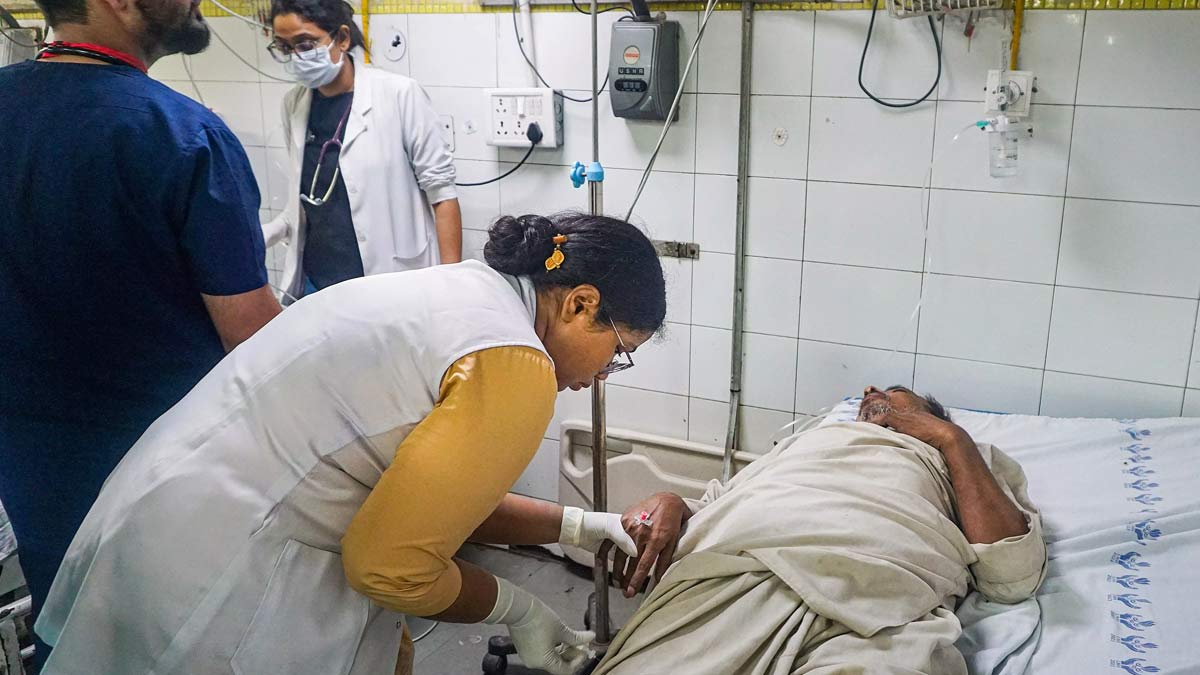
Amid a severe heatwave gripping Delhi, Health Minister Saurabh Bharadwaj has highlighted the vulnerability of individuals with pre-existing health conditions to heatstroke fatalities. During an inspection of the Madan Mohan Malviya Hospital, Bharadwaj disclosed that out of the 14 recent heatstroke-related deaths in the city, almost all the patients had significant comorbidities, such as cancer or kidney disease, which exacerbated their conditions.
Table of Content:-
Evaluation of Hospital Facilities
Bharadwaj's visit to the hospital was a proactive measure to ensure the readiness of medical facilities to handle the surge in heat-related illnesses. He assessed the availability of essential medicines, water, electricity, and cooling systems, and interacted with both patients and medical staff. Emphasising the importance of preventive measures, he directed the hospital staff to ensure all necessary amenities were in place to provide effective treatment for heatstroke patients.

Rising Heatstroke Cases
The minister provided data showing that approximately 310 patients had been admitted to the hospital for heatstroke in recent times, with 112 of them having recovered and returned home. The situation, however, remains critical with 14 deaths reported, almost all involving patients with serious pre-existing conditions. Bharadwaj stressed that the Delhi government is closely monitoring the situation and has arranged adequate medicines and facilities across all hospitals for the treatment of heatstroke patients.
Also Read: International Yoga Day 2024: Celebs Who Swear By Yoga As A Part Of Their Fitness Routine
Government's Response and Preventive Measures
Bharadwaj emphasised the government's commitment to immediate and effective treatment for heatstroke patients. He mentioned that any patient showing symptoms of heatstroke should be promptly admitted to the nearest government hospital to commence treatment and potentially save lives. Furthermore, officials reported 22 fatalities due to suspected heat-related illnesses in the last 24 hours at several hospitals in Delhi, underscoring the severity of the ongoing heatwave.
Adequate Supplies and Cool Environments
The health minister assured that hospitals are well-stocked with all necessary medical supplies, including medicines, injections, and ice packs, to treat heatstroke patients. Additionally, hospitals have made arrangements to provide a cool environment for patients, which is critical in preventing further complications from heat exposure.
Also Read: 90 Hajj Pilgrims From India Dead Amid Scorching Heat In Mecca; All About Heat-Related Illnesses
Collaboration with Police and Ambulance Services
In a collaborative effort, Bharadwaj revealed that the health department has communicated with the Delhi Police Commissioner to aid individuals suffering from heatstroke during night patrols. Police personnel have been instructed to either transport affected individuals to hospitals or notify ambulance services for immediate assistance. To enhance response times, CATs Ambulance Services have been directed to station five ambulances in each of Delhi’s 11 districts, ensuring rapid transportation of heatstroke patients to hospitals.
Public Advisory and Precautionary Measures
The minister appealed to Delhi residents, particularly those working outdoors, to take necessary precautions against the extreme heat. He highlighted the case of a security guard who suffered from prolonged heat exposure and is now recovering in the hospital, illustrating the real and present danger posed by the heatwave.
Nationwide Heatwave Impact
Northern India, including the national capital, continues to endure a prolonged and intense heatwave, resulting in increased heatstroke cases. The situation has prompted the central government to issue advisories to hospitals to establish special units dedicated to treating heatstroke patients. Bharadwaj's inspection and the subsequent measures underscore the Delhi government’s proactive stance in addressing this public health crisis, emphasising the importance of preparedness, rapid response, and public awareness in mitigating the effects of extreme heat.
Bottomline
In conclusion, the ongoing heatwave in Delhi has highlighted the severe impact of high temperatures, particularly on individuals with existing health conditions. The government's efforts to enhance hospital readiness, collaborate with emergency services, and raise public awareness are crucial steps in addressing the crisis and reducing heatstroke fatalities.
Also watch this video
Read Next
Balenzia Socks Expands Its Footprint with New Store Launch at Jolly Grant Airport, Dehradun
How we keep this article up to date:
We work with experts and keep a close eye on the latest in health and wellness. Whenever there is a new research or helpful information, we update our articles with accurate and useful advice.
Current Version